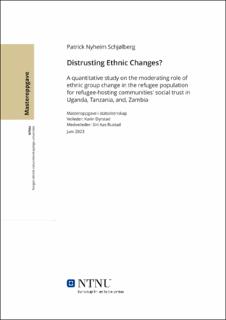| dc.contributor.advisor | Dyrstad, Karin | |
| dc.contributor.advisor | Rustad, Aas, Siri | |
| dc.contributor.author | Schjølberg, Nyheim, Patrick | |
| dc.date.accessioned | 2023-09-07T17:19:55Z | |
| dc.date.available | 2023-09-07T17:19:55Z | |
| dc.date.issued | 2023 | |
| dc.identifier | no.ntnu:inspera:138964717:25552922 | |
| dc.identifier.uri | https://hdl.handle.net/11250/3088027 | |
| dc.description.abstract | Sammendrag
Effekten flyktninger har på sosial tillit i afrikanske vertssamfunn er understudert. Mekanismene for forholdet beror hovedsakelig på studier av europeiske land (Dinesen & Sønderskov, 2015; Jeannet, 2020; McLaren, 2017). Dette er problematisk, da flyktningsituasjonen i Afrika sør for Sahara er langt mer omfattende. Få studier har kvantitativt undersøkt forholdet mellom tillit og flyktninger med afrikansk data, og det lille som eksisterer har hovedsaklig fokusert på politisk og institusjonell tillit (f.eks. Hutchison & Johnson, 2011). I denne avhandlingen undersøker jeg generalisert sosial tillit, som anses som fundamentalt for et velfungerende samfunn. Siden afrikanske land har langt mindre sosial tillit enn europeiske land, kan mekanismene for hvordan tillit utvikles og opprettholdes være forskjellige fra høytillitssamfunnene i den globale norden. Etnisitet er likeledes et område der afrikanske land i stor grad skiller seg fra de etnisk mer homogene europeiske nasjonalstatene.
Etnisitet anses som en viktig faktor for hvordan sosial tillit utvikler og manifesterer seg. Etnisiteten til flyktninger, etnisk fragmentering i vertssamfunnet og etniske forskjeller mellom flyktninger og medlemmer av vertssamfunnet kan derfor være avgjørende, men står samtidig som uutforskede forklaringer på hvordan flyktninger påvirker sosial tillit. Denne avhandlingen tar et viktig første skritt ved å benytte et unikt difference-in-difference-in-differences design med casene Uganda, Tanzania og Zambia. Dette med basis i utviklingen i Kivu-konflikten i Den demokratiske republikken Kongo. Avhandlingen analyserer hvordan nærhet til flyktninger påvirker tillit når flyktninggruppen blir utbyttet av en gruppe med annen etnisitet, sammenlignet med tilfeller der en slik endring ikke finner sted. Resultatene antyder at å bo i nærheten av flyktningleirer kan være assosiert med høyere sosial tillit, mens nærhet til leirer der en etnisk utskiftning i flyktninggruppen finner sted har en sterk og statistisk signifikant negativ effekt på sosial tillit hos respondentene i vertssamfunnet.
| |
| dc.description.abstract | Abstract
The effects refugees have on African host-community attitudes toward social trust are poorly studied. The mechanisms of this relationship are largely derived from studies on European states (Dinesen & Sønderskov, 2015; Jeannet, 2020; McLaren, 2017). This is troubling, as the relative number of refugees far exceeds that of European countries. Few studies have tackled the relationship between trust and refugees quantitatively with African survey data, and those who have are usually concerned with political and institutional trust (e.g. Hutchison & Johnson, 2011). In this thesis, generalized social trust is studied, which is often revered as fundamental for larger society to function well, and in some traditions a key determiner of political trust. As African countries display far lower levels of social trust than European countries, the mechanisms of how trust both develops and is maintained may be different from the high-trust societies of the Global North.
Ethnicity is likewise an area in which African countries greatly differ from the ethnically quite homogeneous European nation-states. Ethnicity is viewed as an important determiner of how social trust develops and manifests. The ethnicity of refugees, ethnic fractionalisation in the host community, and ethnic differences between refugees and host-community members can therefore be similarly important yet stands as previously unexplored intermediary explanations for understanding how refugees affect social trust. This thesis makes an important first step by utilising a unique difference-in-difference-in-differences design in Uganda, Tanzania, and Zambia framed by the developments in the Kivu conflict in the Democratic Republic of the Congo. This thesis analyse how proximity to refugees affect trust if the majority ethnic group changes compared to where it is constant. The results indicate that living in proximity to a refugee settlement may be associated with higher social trust, whereas proximity to settlements where ethnic change occurs in the refugee group have a strong and statistically robust negative effect on social trust for the host-community members. | |
| dc.language | eng | |
| dc.publisher | NTNU | |
| dc.title | A quantitative study on the moderating role of ethnic group change in the refugee population for refugee-hosting communities' social trust in Uganda, Tanzania, and, Zambia | |
| dc.type | Master thesis | |
